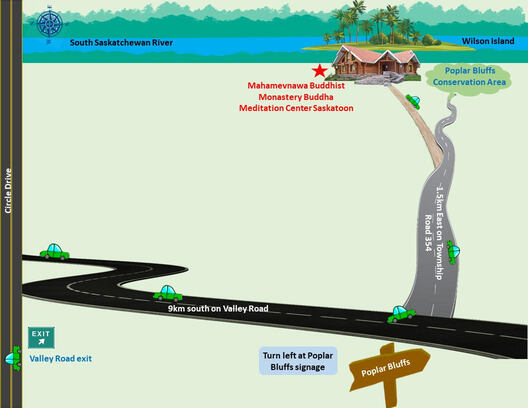|
Namo Buddhaya!
Namo Tassa Bhagavato Arahato Samma Sambuddhassa ! Homage to the Blessed One, the Worthy One, the Supremely Enlightened One! Anuruddha Sutta – Eight Thoughts of a Great Person. (The Supreme Buddha Preached this discourse to Venerable Anuruddha first and then to Bhikkus.) (1) " Bhikkhus, this Dhamma is for one with few desires, not for one with strong desires. Here, when a bhikkhu is one with few desires, he does not desire: ‘Let people know me to be one with few desires.’ When he is content, he does not desire: ‘Let people know me to be one who is content.’ When he resorts to solitude, he does not desire: ‘Let people know me to be one who resorts to solitude.’ When he is energetic, he does not desire: ‘Let people know me to be energetic.’ When he is mindful, he does not desire: ‘Let people know me to be mindful.’ When he is concentrated, he does not desire: ‘Let people know me to be concentrated.’ When he is wise, he does not desire: ‘Let people know me to be wise.’ When he delights in non-proliferation, he does not desire: ‘Let people know me to be one who delights in non-proliferation. ''
(2) " Bhikkhus, this Dhamma is for one who is content, not for one who is discontent. Here, a bhikkhu is content with any kind of robes, almsfood, lodgings, and medicines and provisions for the sick. ''
(3) " Bhikkhus, this Dhamma is for one who resorts to solitude, not for one who delights in company. Here, when a bhikkhu resorts to solitude, bhikkhus, bhikkhunis, male lay followers, female lay followers, kings, royal ministers, heads of other sects, and disciples belonging to other sects approach him. In each case, with a mind that slants, slopes, and inclines to seclusion, withdrawn, delighting in renunciation, he gives them a talk invariably concerned with dismissing them. '' (4) " Bhikkhus, this Dhamma is for one who is energetic, not for one who is lazy. Here, a bhikkhu has aroused energy for abandoning unwholesome qualities and acquiring wholesome qualities; he is strong, firm in exertion, not casting off the duty of cultivating wholesome qualities. '' (5) "Bhikkhus, this Dhamma is for one with mindfulness established, not for one who is muddle-minded. Here, a bhikkhu is mindful, possessing supreme mindfulness and alertness, one who remembers and recollects what was done and said long ago.'' (6) " Bhikkhus, this Dhamma is for one who is concentrated, not for one who is unconcentrated. Here, secluded from sensual pleasures, secluded from unwholesome states, a bhikkhu enters upon and abides in the first jhana, which is accompanied by applied and sustained thought, with rapture and pleasure born of seclusion. With the stilling of applied and sustained thought. He enters upon and abides in the second jhana, which has self – confidence and singleness of mind without applied and sustained thought, with rapture and pleasure born of concentration. With the fading away as well of rapture, he abides in equanimity, and mindful and fully aware, still feeling pleasure with the body. He enters upon and abides in the third jhana, on account of which noble ones announce: 'He has a pleasant abiding who has equanimity and is mindful.' With the abandoning of pleasure and pain, and with the previous disappearance of joy and grief. He enters upon and abides in the fourth jhana, which has neither – pain, nor – pleasure and purity of mindfulness due to equanimity. (7) " Bhikkhus, this Dhamma is for one who is wise, not for one who is unwise. Here, a bhikkhu is wise; he possesses the wisdom that discerns arising and passing away, which is noble and penetrative and leads to the complete destruction of suffering.'' (8) " Bhikkhus, this Dhamma is for one who delights in non-proliferation, who takes delight in non-proliferation, not for one who delights in proliferation, who takes delight in proliferation. Here, a bhikkhu's mind launches out upon the cessation of proliferation, becomes placid, settles down, and is liberated in it. '' Then the Venerable Anuruddha spent the next rains residence right there among the Cetis in the eastern bamboo park. Dwelling alone, withdrawn, heedful, ardent, and resolute, in no long time the Venerable Anuruddha realized for himself with direct knowledge, in this very life, that unsurpassed consummation of the spiritual life for the sake of which clansmen rightly go forth from the household life into homelessness, and having entered upon it, he dwelled in it. He directly knew: "Destroyed is birth, the spiritual life has been lived, what had to be done has been done, there is no more coming back to any state of being." And the Venerable Anuruddha became one of the arahants. Sādhu ! Sādhu !! Sādhu !!! (The Numerical Discourses of the Buddha, (1160 p.) English Translation by Ven. Bhikkhu Bodhi, Wisdom Publications) For reading : Wisdom Publications. - http://www.wisdompubs.org 1 In the Buddha's Words - Ven. Bhikkhu Bodhi, 2 The Connected Discourses of the Buddha – Ven. Bhikkhu Bodhi, 3 The middle Length Discourses of the Buddha – Ven. Bhikkhu Nanamoli and Ven. Bhikkhu Bodhi, 4 The Numarical Discourses of the Buddha – Ven. Bhikkhu Bodhi, 5 The Long Discourses of the Buddha – Maurice Walshe Mahamevnawa Buddha Meditation Centre of Saskatoon, facebook.com/MeditationSaskatoon meetup.com/MeditationSaskatoon instagram.com/MeditationSaskatoon MeditationSaskatoon.org [email protected] 306 374 2840
0 Comments
Leave a Reply. |
Directions to Monastery1. Take Valley Road exit from Circle Drive and drive 9 km.
2. Turn left at the Poplar Bluffs signage on to Township Road - 354. 3. Drive 1.5 km on 354 Township road. This way is to Poplar Bluffs Conservation Area 4. Turn left on to the driveway at the multi-color Buddhist flag at the gate. That is our driveway. It's is a log house. Date and Time in Saskatoon |
|
Mahamevnawa Buddhist Monastery Saskatoon Inc. Charitable Registration No. 81818 5522 RR0001
© All rights reserved by Mahamevnawa Buddhist Monastery Saskatoon


